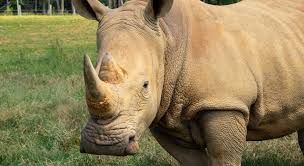
Dozens of White Rhinos Relocated from South Africa to Rwanda in Conservation Effort

 :
| Updated On: 11-Jun-2025 @ 12:07 pm
:
| Updated On: 11-Jun-2025 @ 12:07 pmSHARE
In a groundbreaking conservation effort, 70 southern white rhinos were successfully relocated from South Africa to Rwanda in what is being called the largest rhino translocation of its kind. The initiative is part of a broader “rewilding” program aimed at restoring endangered species to safe and well-managed natural habitats across Africa.
The rhinos undertook a journey of over 3,400 kilometers (approximately 2,112 miles), traveling first by road and then by air. They were transported in two separate groups of 35 from the Munywana Conservancy in South Africa to Rwanda’s Akagera National Park — Central Africa’s largest protected wetland. The Rwanda Development Board (RDB), which oversaw the operation, confirmed that the final leg of the journey involved moving the rhinos in individual steel crates by truck from Munywana to Durban’s King Shaka International Airport. From there, they were carefully loaded onto a Boeing 747 cargo aircraft using cranes and flown to Kigali International Airport in Rwanda. The last stretch was completed by road to Akagera National Park.
This translocation marks the first time rhinos have been moved by air on such a large scale. The overall goal of the project is to rewild more than 2,000 white rhinos across Africa by relocating them to protected areas where they can breed safely and contribute to species population recovery. Upon arrival, the 70 rhinos were released into the park after their two-day journey. A specialized veterinary team will monitor their adaptation process to manage stress and ensure the animals adjust well to their new environment.
This effort comes at a time when white rhinos are facing increasing threats. Once widespread across sub-Saharan Africa, white rhinos have suffered a significant population decline due to decades of poaching and trophy hunting, particularly during the colonial era. Although conservation programs have helped stabilize their numbers to some extent, threats remain high.
According to the International Rhino Foundation (IRF), rhino poaching in Africa increased by 4% from 2022 to 2023, with at least 586 rhinos poached in 2023 alone. The southern white rhino, one of the two remaining subspecies, is currently listed as “near threatened” by the International Union for Conservation of Nature (IUCN), with approximately 17,000 individuals left in the wild. The situation is far more critical for the northern white rhino, with only two known mature individuals remaining globally, both female, making natural reproduction nearly impossible.
The rewilding project led by the Rwanda Development Board, in collaboration with South African conservationists and other global partners, is seen as a major step forward in the fight to conserve white rhinos. By creating a secure breeding population in Rwanda, the program hopes to serve as a model for future translocations and conservation strategies, ensuring that rhinos continue to survive and thrive in the wild.
Overall, this translocation highlights both the urgency and potential of international cooperation in wildlife conservation, offering hope for the long-term survival of one of Africa’s most iconic and endangered animals.
Contact Us
House. No. : 163, Second Floor Haridev Rd, near Puberun Path, Hatigaon,Guwahati, Assam 781038.
E-mail : assaminkcontact@gmail.com
Contact : +91 8811887662
Enquiry
×
Reporter Login
×